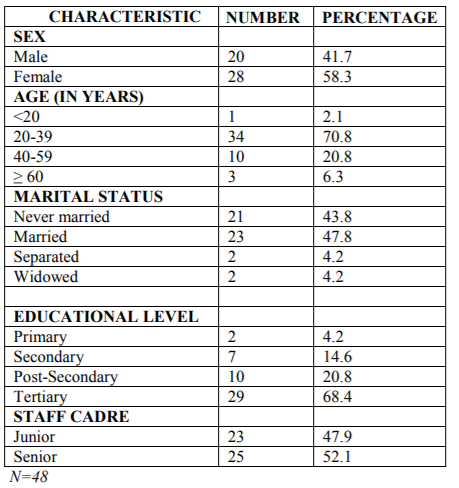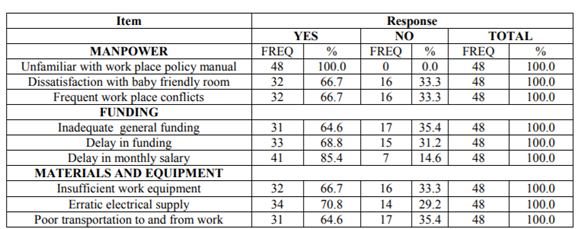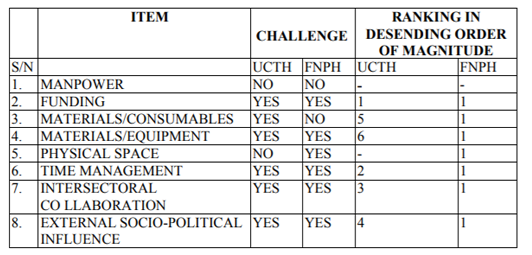Information
Journal Policies
Perceived Management Challenges in Tertiary Health Facilities in Calabar, Southern Nigeria
Ndifon. W. O.1, Omoronyia O.1, Mkpanam N. E.1, Ameh S.1, Akpet O. E.1
Copyright : © 2017 Authors. This is an open-access article distributed under the terms of the Creative Commons Attribution License, which permits unrestricted use, distribution, and reproduction in any medium, provided the original author and source are credited.
Background: Currently, managers of tertiary health facilities in Nigeria face daunting challenges of running these complex organizations.
Objectives: To identify the management challenges in tertiary health facilities in Calabar, Southern Nigeria.To identify the factors influencing the management of these tertiary health facilities.
Methods: A cross-sectional descriptive study was conducted to identify the perceived management challenges in Calabar, southern Nigeria in July 2011. Using a pre-tested a semi-structured questionnaire, information was obtained from forty-eight respondents in the University of Calabar Teaching Hospital and the Federal Neuro-Psychiatry Hospital, both in Calabar. The medical directors of both health facilities were also interviewed.
Results: The major perceived management challenges identified were unfamiliarity with the work place policy manual, dissatisfaction with the baby-friendly arrangement, frequent work place conflicts, inadequate funding, insufficient work equipment, poor transportation to and from work, erratic electrical power supply and undue external socio-Spolitical influence.
Conclusion: A critical appraisal of the perceived challenges and the application of well tailored solutions are needed.
management, challenges, tertiary, facilities, health, Calabar,Public Health and Community Medicine
1. Introduction
Tertiary health facilities are complex organizations with the mandate to manage complicated health problems, produce health professionals and specialists, as well as conduct research and provide outcomes that will influence policy regarding health issues. Managing these facilities, especially in resource-poor environments, can be quite daunting. These range from issues of funding to maintaining a delicate balance between productivity and staff satisfaction. Many managers of Nigeria’s tertiary health facilities have been known to lack the requisite management capacity building skills training.[1,2] Although these managers are medical experts, there is dire need for management capacity building to enable them square up to the challenges encountered in heading these facilities [3]. This study was aimed at identifying these challenges and the factors influencing management of tertiary facilities in Calabar, southern Nigeria.
2. Methods
This description study was conducted in July 2011 and involved staff of the two tertiary health facilities in Calabar, southern Nigeria, namely, University of Calabar Teaching Hospital and Federal Neuropsychiatric Hospital.
The questionnaire was developed after review of relevant literature and modified after being pre-tested on ten members of staff not in the department/units used in the final sample.
Permission was obtained from the medical directors of the hospitals before commencement of the study. Informed consent was also obtained from the respondents. With each of the department serving as a stratum, stratified random sampling was used to select twenty- five members of staff from each of the two health facilities.
Data were collected by a trained research assistant using self-administered questionnaire with closed questions.The questions focused on whether the respondents were satisfied or not with the four major areas of management, namely, manpower, funding, materials and equipment. Of the fifty respondents, forty- eight (96%) correctly completed the questionnaire. The medical directors were also interviewed on what they perceived as management challenges and requested to rank the challenges in decreasing order of magnitude. Data analysis was done using STATA version 12 software.
3. Results
Table 1 Shows that twenty of the respondents were male, while twenty-eight were female. Most (70.8%) of them were aged between 20 and 39 years. The respondents were nearly evenly distributed into the never married and married ones just as they were in the work cadre. Majority (60.4%) of them had tertiary education.
As shown in Table 2, none of the respondents was familiar with the work place policy manual and most (66.7%) were dissatisfied with the baby-friendly room arrangement. An equal proportion (66.7%) reported frequent work place conflicts. Funding was generally inadequate (62.6%) and was often delayed (68.8%), just as the payment of monthly salaries (85.4%).
Table 3 shows the management challenges of the two health facilities as perceived by the medical directors and the ranking of the magnitude of the challenges. Manpower, in terms of quantity and quality, was not perceived as challenges by the both of them. While availability of materials and consumables was not seen as a challenge in the Federal Neuro- Psychiatric Hospital (FNPH), this was not the case in the University Of Calabar Teaching Hospital (UCTH). On the contrary, while physical space was not a challenge in UCTH, it was a challenge in FNPH. In ranking of the magnitude of the challenges, funding was the greatest challenge in both health facilities. While availability of machines and equipment was perceived as the least challenging in UCTH, the medical director of FNPH ranked all the challenges as number one, that is, all the challenges were equally enormous.
4. Discussions
Heads of organizations, be they public or private, are ever mindful of the cost implications, especially personal emoluments, of a large work force. This may explain why medical directors of both health facilities did not perceived manpower need as a challenge. This agrees with the findings of earlier workers that health manpower distributions in Nigeria favours the urban population, where tertiary health facilities are located, at the expense of the hard-to-reach rural areas for the singular notion that the educated, the rich and powerful live in urban areas.[4,5]
It is noteworthy, that none of the respondents was familiar with the work place policy manual. When this deficiency is combined with the fact that the heads of these health facilities lack the requisite management training skills as found by Block in 1988 and Attah in 1995, then there is little wonder why majority of the respondents reported frequent work place conflicts.[1,2] This challenge of managerial incapacity adversely affects the effective delivery of health services and therefore underscores the need for requisite management capacity training.
The extended family system in Africa favours the culture of baby-sitters being relatives of working mothers operating from home. Most mothers are still skeptical of the safety of their children in the work environment, especially with the socio-cultured belief that their children may be bewitched or poisoned. Thus the practice of baby friendly room is yet to be popular in our environment, though most working mothers in this study reported the need for such conveniences. There is therefore the need for baby-friendly rooms in our health facilities.
Inadequate funding is one of the greatest challenges in tertiary health facilities, especially as these facilities handle complex health problems requiring highly skilled personnel and advanced technology, both which are capital-intensive.
Moreover, these hospitals conduct research and provide outcomes to the government as a way of influencing health policies. Furthermore, they are expected to be fully developed and accredited for teaching various health disciplines in order to produce health professionals and specialists that can favourably compete with their counterparts anytime, anywhere in the increasingly competitive global environment. Not surprisingly, majority of the respondents in this study mentioned inadequate, delayed funding and delayed monthly salaries as challenges. This agrees with findings by other workers.[4,6,7]
Provision and maintenance of basic infrastructure and equipment have been recognised as key challenges to health managers worldwide. This fact, identified by earlier workers [8-10] has been corroborated by findings in this study.
In addition to performing their primary medical specialist functions, heads of tertiary health facilities attend to administrative duties. Moreover, they are daily inundated with requests for attention by contractors and favour seekers. The consequence is that these chief executives have problems with crowd control and time management. This was confirmed by study and underscores the dire need for acquiring time management skills by health service managers.
Strong intersectoral collaboration is one of the pillars of effective and efficient health service management, but amazingly, this was found to be weak in this study. Undue external socio-political influence, especially from the kinsmen and benefactors, coupled with weak strategic support from policy makers have been noted as the albatross of chief executives of large organizations like tertiary facilities. This was unveiled from interactions with the medical directors in this study, just as earlier workers found. [11-13] there is need for the Federal Government of Nigeria to demonstrate a robust political commitment that transcends mere rhetoric and ceremony. This will undoubtedly goo a long way in enabling the tertiary health facilities achieve the goals for which they were established.
5. Conclusions
Tertiary health facilities face daunting challenges, but there are not insurmountable. A critical appraisal of these problems and the applications of well-tailored solutions like capacity building, sustained political support and improved funding can adequately address the identified challenges.
References
- Block, P. The Empowered Manager: Positive Skills at work; Jossey-Bass Publishers, London.1988.
- Attah, J.O. ―Internal Control Systems in Tertiary Health Institutions in Nigeria‖. Unpublished Masters of Health Planning and Management Thesis; Department of Political Science and Administration University of Maiduguri, Nigeria. 1995
- Pillay, R. Managerial competencies of hospital managers in South Africa: a survey of managers in the public and private sectors. Human Resources for Health 2008, 6:4
- Asuzu, M. The necessity for a health systems reform in Nigeria. Journal of Community Medicine & Primary Health Care. 2004; 16 (1) 1-3.
- Ademiluyi, IA. Aluko-Arowolo, S.O. Infrastructural distribution of healthcare services in Nigeria: An overview. Journal of Geography and Regional Planning 2009; 2(5): 104-110
- Stilwell, B; Awofeso, N. Managing brain drain and brain waste of health workers in Nigeria. Bulletin of World Health Organization. 2004; 82:595-600
- Naicker, S; Plange-Rhule, J; Tutt, R; Eastwood, J. SHORTAGE OF HEALTHCARE WORKERS IN DEVELOPING COUNTRIES—AFRICA. Ethnicity & Disease, 2009; Vol 19,
- Onifade, K. Informatics in Hospital Management, An unpublished MSC Research Report, Department of Business Administration, University of Lagos, Nigeria 2003
- Shohet, I.M. Key performance Indicators for Maintenance of Health Care Facilities 2003; 21(1) 5-12.
- Al-Bader, S; Masum, H; Simiyu, K; Daar, A; Singer, P. Science-based health innovations in sub-Saharan Africa. BMC Int Health Hum Rights. 2010; 10(Suppl 1): S1
- Pang, T. From immune system to health systems - Challenges for health research. Immunology and Cell Biology 2004; 82, 149–153.
- Aaserud, M; Lewin, S; Innvaer, S; Paulsen, E; Dahlgren, A; Trommald, M; Duley, L; Zwarenstein, M; Oxman, A. Translating research into policy and practice in developing countries: a case study of magnesium sulphate for pre-eclampsia. BMC Health Services Research 2005; 5:68.
- Vian, T. Review of corruption in the health sector: theory, methods and interventions. Health Policy Plan. 2008; 23 (2): 83-94







